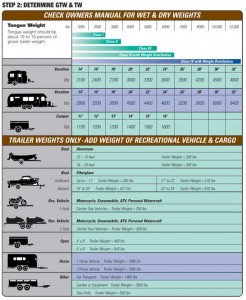Tow Tips from Joes Hitch and Trailer
 As a Company that has been in business for nearly 80 years, we certainly know a thing or two about safety. So, I thought I’d share the top safety towing tips based on questions and feedback from our customers. With boating, camping & RV season in full swing, these tips are especially handy.
As a Company that has been in business for nearly 80 years, we certainly know a thing or two about safety. So, I thought I’d share the top safety towing tips based on questions and feedback from our customers. With boating, camping & RV season in full swing, these tips are especially handy.
1. The most important thing you need to know is the towing capacity of your car, truck or SUV. Pulling too much weight is extremely dangerous. Your vehicle has certain tow ratings that must match the hitch system you choose. If you don’t know the towing capacity of your vehicle, just check the owner’s manual. The goal is not to exceed the vehicles towing capacity. This includes the trailer and its contents. So, if you’re unsure about the trailer weight, just pull into a public scale and find out.
2. Make sure the hitch ball is secure in the mount before towing. The lock nut & washer need to be torqued to the manufacturer’s specs depending on the shank size of the ball. A standard ratchet or crescent wrench won’t supply the sufficient torque needed, so make sure you have a torque wrench to tighten it up correctly! While you’re at it, make sure the pin and clip securing the ball mount are in tact. This very simple pin and clip can be a major catastrophe and an easy step to forget.
3. When trailer hitches and their connections are not properly secured, they can cause serious accidents. That’s why safety chains are extremely important in the event your trailer becomes disengaged from your tow vehicle. These metal chain links vary in length and width, so make sure you chose the right size chain for the weight of your trailer. Just criss-cross the chains under the trailer tongue and attach to your tow vehicle. Make sure they don’t drag and give’em a little tug……..it’s that simple. Safety chains are required everywhere in the United States.
4. Improper braking is another hazard to avoid. The more weight you pull, the harder it is to stop. When purchasing a trailer or camper, opt for one that has brakes. And if you do, most likely you will need a braking system in your tow vehicle. Most states require trailer brakes when the fully loaded weight exceeds a certain limit.
5. Lighting is critical for trailers because the rear facing lights of the vehicle are typically obstructed by the trailer. Laws require trailers have specific lights, which means tapping into the tow vehicles electrical system. Be sure wires or plugs don’t scrape the ground. Connections will get dirty, so keep’em clean.
6. The proper loading of your trailer is essential to safe towing, as unbalanced loads can cause serious trailer sway. Balance it up by loading from side to side and along the length of the trailer. Place the heavier goods in the front and over the axles since this is the strongest area. Always use ratchet straps or tie downs to keep your cargo from sliding or falling out. Remember, gravity is not an acceptable method of securing a load!
By Jamey Wozniak, Owner/CEO Joes Hitch, Trailer & Truck Accessories
Jamey@Joes-HitchAndTrailer.com
as seen on AskPatty.com
Category: Trailers










